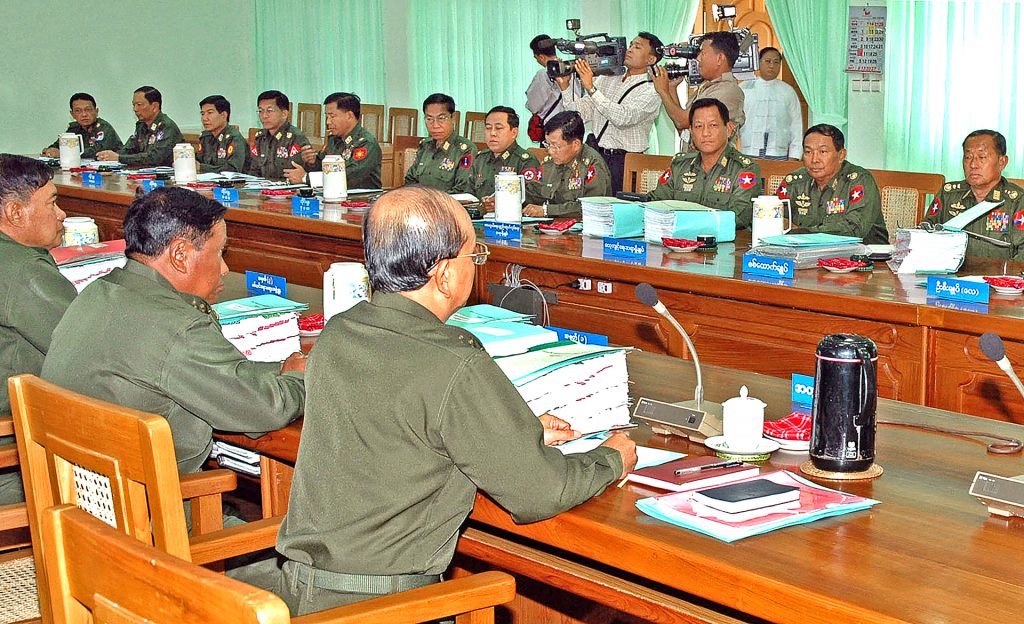Insight Email Vol-2 No. 1
This Insight Email is published on January 23, 2024, as a translation of the original Burmese language version that ISP-Myanmar sent out to the ISP Gabyin Community members on January 19, 2024.
EDITOR’S NOTE
The previous ISP Insight Email No. 24, published on September 29, 2023, initially delved into “Naypyitawlogy.” ISP-Myanmar redubbed this termi-nology from the notable usage of “Kremlinology,” “Pyongyangology,” and “Pekingology,” which speculate on political changes in closed societies. Under the overarching theme of “Naypyitawlogy,” ISP-Myanmar analyzed the nature of a closed dictatorship, drawing parallels to how international political experts assess developments in such systems. Our exploration of Naypyitawlogy continued in ISP Insight Email No. 25, entitled “A Few Good Men: The Military’s Succession Crisis.” Going forward, we plan to address issues under this theme whenever it is appropriate to do so.
Following the launch of the Operation 1027, the State Administration Council’s (SAC) forces had to relinquish numerous camps, human resources, weapons, and cities. This is the most devastating loss the military has had to endure in the post-independence era. It will be intriguing to observe the reactions of the former military leaders in response to these situations. This week’s “Key Takeaway” centers on the dynamics of the relationship between the current Commander-in-Chief of Defense, Snr. Gen. Min Aung Hlaing, and former senior military officials.
Moving on, the “Trends to Watch” section discusses the sustainability of the temporary ceasefire brokered by China between the Three Brotherhood Alliance (3BHA) and the SAC. It remains to be seen whether this ceasefire will endure or if the conflict will reignite with new vigor. Another topic of discussion is the global elections scheduled in 2024. Unfortunately, in Myanmar, achieving political stability and democratic elections still seems to be a distant aspiration.
KEY TAKEAWAY
Naypyitawlogy – 3
The Old Guards and Min Aung Hlaing
The Tatmadaw is facing an unprecedented loss in the post-independence era. How do the Tatmadaw seniors view this situation?
Popular support of the Tatmadaw in politics deteriorated massively since the 2021 coup and it is now at an all-time low. The role of Tatmadaw consistently framed as the guardians of the nation by successive Tatmadaw leaders, and its centrality in Myanmar politics (Literally, according to Section 6, Article (f) of Myanmar’s 2008 Constitution, one of the consistent objectives of the country is to “enable the Defence Services to participate in the national political leadership role of the State”) are currently facing challenges. The Tatmadaw’s role in politics has not been a success while their main duties in defense and military sectors have faced failures.
When Senior General Min Aung Hlaing orchestrated the overthrow of the elected civilian government in a coup, it appeared as if he had opened Pandora’s Box, unleashing a cascade of unexpected misfortunes. The stability and public goodwill accumulated during a decade of democratic transition were swiftly eroded, and an economy that had been gaining momentum was abruptly halted, forced into contraction. In stark contrast, the aftermath witnessed a surge in sanctions, scarcity, instability, and widespread warfare, accompanied by the emergence of new armed forces across the country. The repercussions include rising market prices, electricity cuts, and irregular trade flows, rendering long-term investment unfeasible. Politically, three years post-coup, a viable political resolution seems elusive. The elections promised by the SAC for 2024 also appear neither planned nor imminent.
However, it appears that Min Aung Hlaing has no intention of engaging with political forces, as key political figures are still imprisoned and well-regarded political parties have been disbanded by a single directive. The National Ceasefire Agreement (NCA) has faced an impasse, hindering the peace process. Despite the SAC proposing a federal democracy, the opposition and other political forces find it difficult to trust these overtures. These circumstances deviate from the expectations of former military leaders and suggest that Snr. Gen. Min Aung Hlaing has erased with his foot what was written by the seniors with their hands.
Myanmar experienced a political transition in 2010 under the 2008 Constitution proposed by the Tatmadaw. This marked the beginning of a political reform led by Tatmadaw, and an attempt to partially open the country to put it back on the right track. However, the former military junta, led by Than Shwe, did not transfer power to an elected government. Instead, it was handed to the Union Solidarity and Development Party (USDP) backed by Tatmadaw. Literature on this political transition written by some former Tatmadaw leaders described it as a plan for the Tatmadaw and USDP to jointly govern the country for the next 50 years. This plan indicates that Than Shwe wanted to avoid the fates of his predecessors Ne Win and Saw Maung, and to remain peacefully in retirement until his last breath.
However, it seems that 91-year-old Than Shwe is not at ease under the present circumstances. In early May 2023, Qin Gang, the former Foreign Affairs Minister of China, visited Naypyitaw to meet Than Shwe and former president Thein Sein (See ISP OnPoint No. 14). This visit suggested that China considered former Tatmadaw leaders to still hold influence over the country’s transition. Another possible motivation behind China’s move is linked to Than Shwe’s selection of Snr. Gen. Min Aung Hlaing as his successor for the position of Commander-in-Chief of Defense during the 2011 transition. Currently among Chinese politicians, there is widespread confusion regarding the Tatmadaw.
Sources close to former Tatmadaw officers indicate that Than Shwe has his gates open for those who want to pay homage to him or ask for his advice. Therefore, he might have heard the country’s situation through his apprentices (if he chooses to listen to it). Notably, Aung San Suu Kyi also visited Than Shwe during the pre-coup period. Informed sources suggest that Than Shwe has commented on Snr. Gen. Min Aung Hlaing’s post-coup actions as “overconfident.” Other informed sources state the increase in security around Than Shwe’s mansion, as well as Snr. Gen. Min Aung Hlaing’s visit together with his extended family only for personal reasons without giving Than Shwe a chance to engage in political talk.
On the other hand, it seems that Thein Sein does not want to ruin his good reputation as a reformist by getting involved in the current political turmoil. Notably, his absence from the 8th anniversary event of the NCA is intriguing, especially when Thura Shwe Mann was seen attending. Moreover, aging is evident among former military figures like Maung Aye, the former Deputy Commander-in-Chief of Defense, and Khin Nyunt, the former Chief of Intelligence. In the history of Myanmar’s Tatmadaw, individuals who have left the institution typically refrain from involvement in current military affairs. Forming cliques among military officers of the same Defense Service Academy (DSA) cohort, which is usually present in other countries, is notably absent in Myanmar.
By the time Snr. Gen. Min Aung Hlaing (DSA-19) became Commander-in-Chief of Defense, there was a huge generation gap between him and his predecessors. Former Commander-in-Chief Snr. Gen. Than Shwe was from the Officers Training School (OTS) 9th batch and Vice Snr. Gen. Maung Aye was from the DSA 1st batch. Likewise, Snr. Gen. Min Aung Hlaing seems to want his successor to be several generations away from him. This has led to the succession crisis in the Tatmadaw (See ISP Insight Email No. 25). Upon assuming the role of Commander-in-Chief of Defense, Snr. Gen. Min Aung Hlaing implemented a strategy of distancing generation gap in the Tatmadaw, involving the retirement, reassignment to auxiliary forces or placement in political positions of close batch members from the DSA. It seems he is consolidating his power within the military.
Some believe these people to be in the same DSA cohort as Deputy Commander-in-chief of Defense Vice Snr. Gen. Soe Win. He was in DSA-22 and many mention that this cohort consists of many smart officers. For instance, Ye Htut, who was recently sentenced to ten years in prison due to his criticism of the current regime (also a former presidential spokesperson and Minister of Information) is from the cohort DSA-22. Maung Maung Ohn, the current SAC’s Minister of Information, and Yar Pyae, who was initially reassigned to auxiliary forces and has recently become Minister of Home Affairs are also from the same cohort. In addition, Gen. Thura Thet Swe, former navy Commander-in-Chief who retired after transitioning to politics, and Lt. Gen. Kyaw Swe, former Minister of Home Affairs during National League for Democracy’s (NLD) reign who was later removed, are also from DSA-22.
Following the devastating loss of so much territory due to the Operation 1027, there has been heavy criticism of Snr. Gen. Min Aung Hlaing by former and current military officers. The Kunlong strategic outpost, which was once successfully defended against the Communist Party of Burma (CPB) after a 40-day battle, has now been occupied by the 3BHA forces. The Kokang region, as well as Laukkai, have also been given up. Currently, there are no Tatmadaw military camps east of the Salween River in northern Shan State. Lashio, where Northeastern Command is located, is also under threat. These incidents occurred merely two months after the National Defense and Security Council (NDSC) meeting, during which the acting president of the SAC, Myint Swe, warned that the situation might escalate to “split the country into parts”. Meanwhile, Snr. Gen. Min Aung Hlaing appears to be distancing himself from the battles and whatever is happening, as he was seen attending events and delivering speeches that seem disconnected from reality (See ISP Timeline in this issue for his full activities). All of these actions explicitly highlight his lack of accountability and responsibility.
In addition, his negligence, improvisation of ad hoc wishes in the speeches, and making independent decisions without considering advises from others have led to even his admirers starting to express dissatisfaction.
Another group of leaders who are dissatisfied with Snr. Gen. Min Aung Hlaing are the USDP leaders who retired from the military and transitioned into politics. These people could gain governmental power if an election were to take place. However, there are no foreseeable timeframe when this election might occur. The USDP stated that over a thousand members of their party had been targeted and assassinated following the coup. On the other hand, there is the thinking of devolving power instead of concentrating power in one person’s control if the SAC-planned election comes into reality.
A conspicuous event occurred in September 2022. Former Brig. Gen. Ohn Thwin and his son-in-law, a former captain, were assassinated. This event sent shock-waves through the entire retired military community, leading to a reduction in in-person contacts and relocations to Naypyitaw and other secure locations. This phenomenon came to be known as “the Ohn Thwin Factor.” The weakened security situation has had an impact on former Tatmadaw officers. Former senior officers have little influence on the military regarding its current situation. However, their support of Snr. Gen. Min Aung Hlaing is noticeably decreasing. They do not want their previous efforts to bolster the role and reputation of the Tatmadaw to turn to dust. At the same time, pro-military supporters and social media pages assumed to be orchestrated by the military are making criticisms of the role of Min Aung Hlaing’s Tatmadaw in the country.
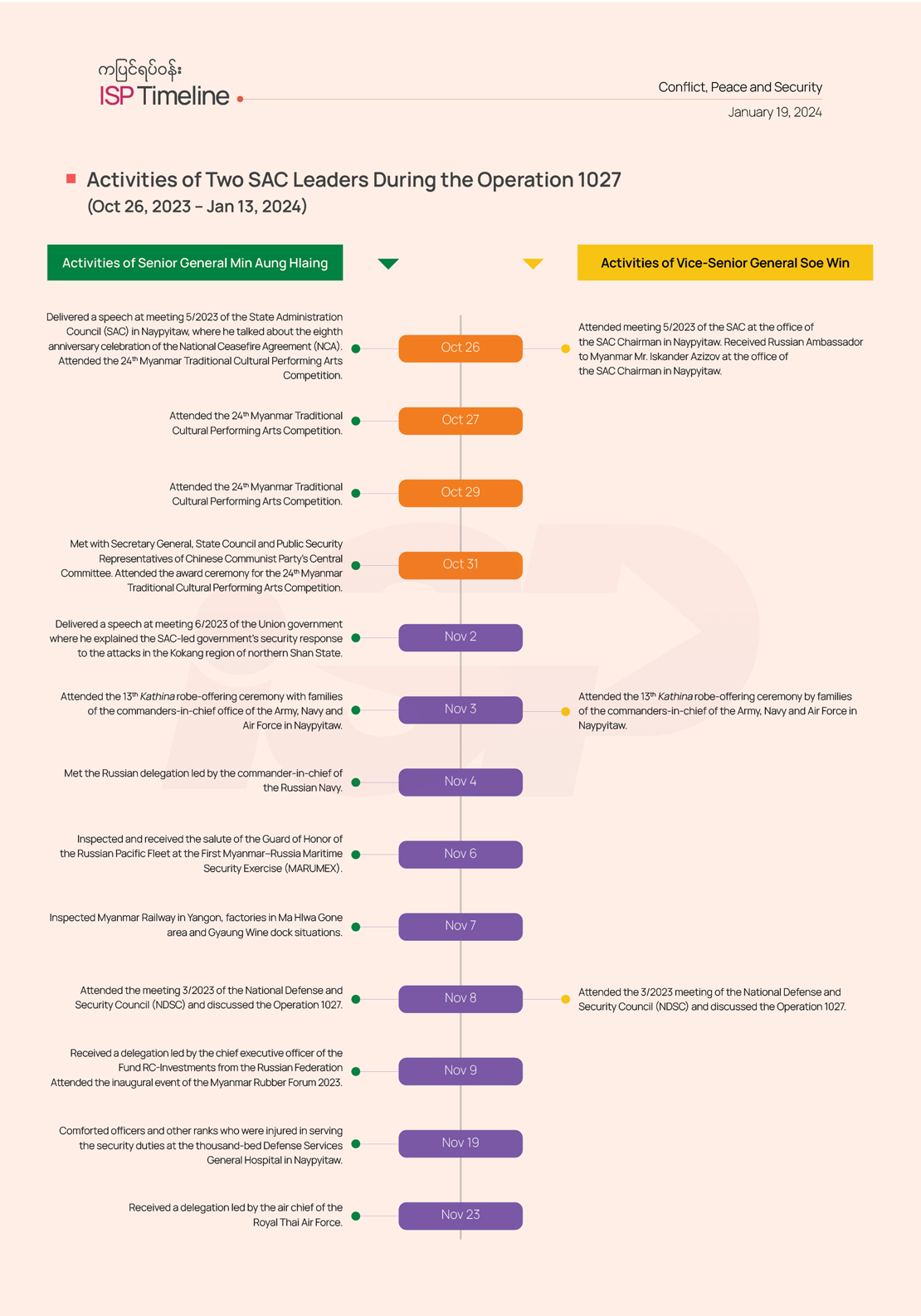
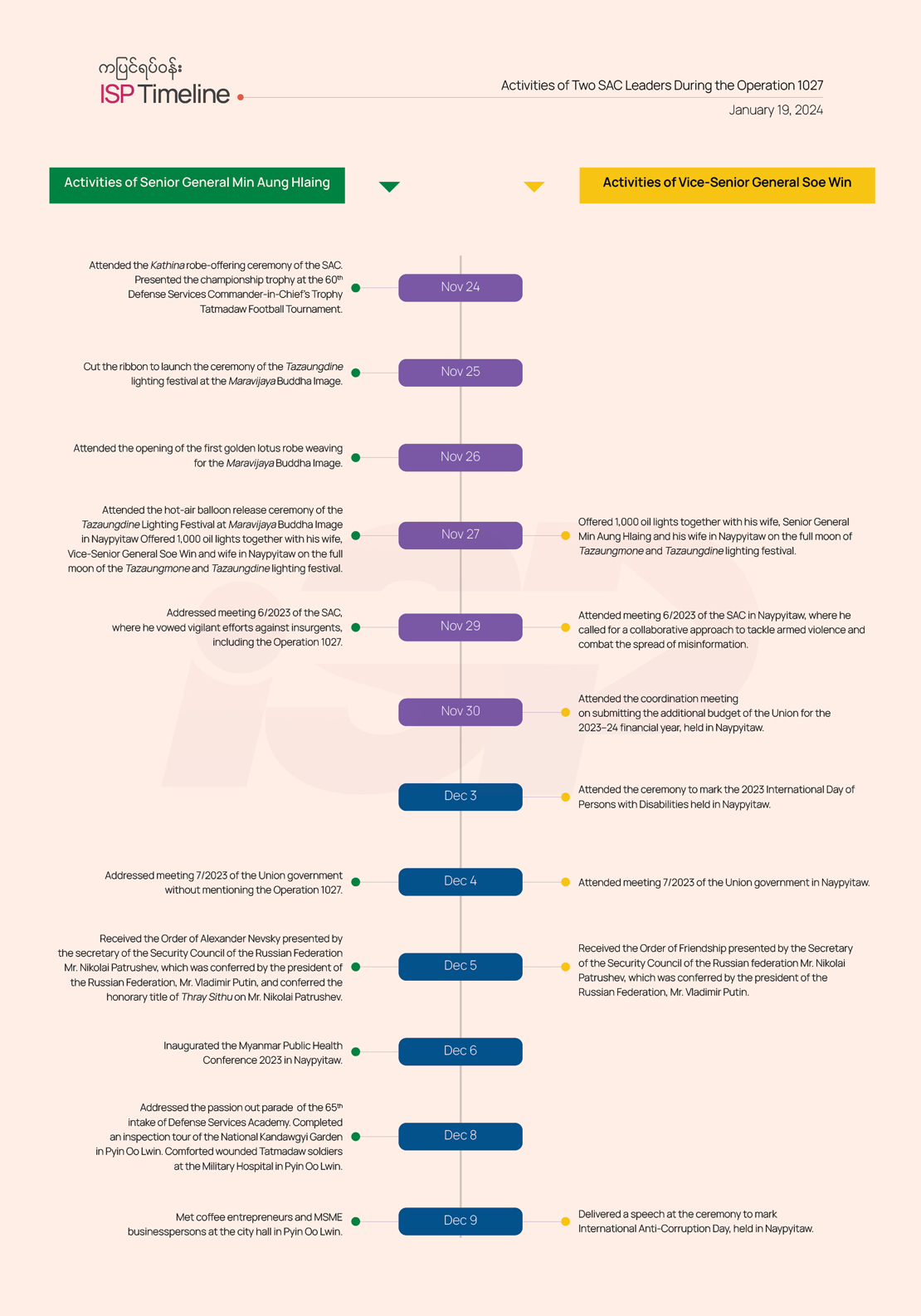
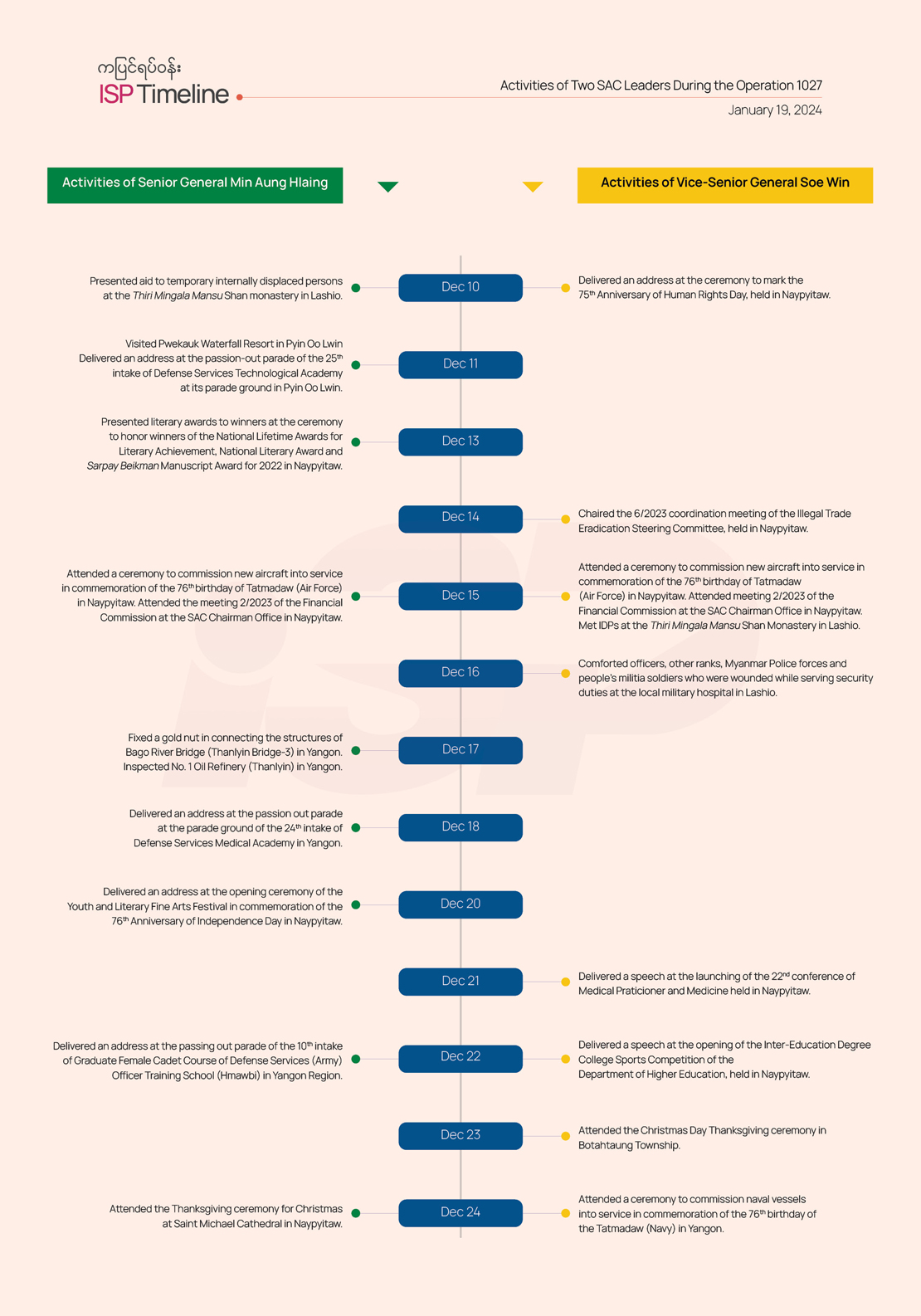
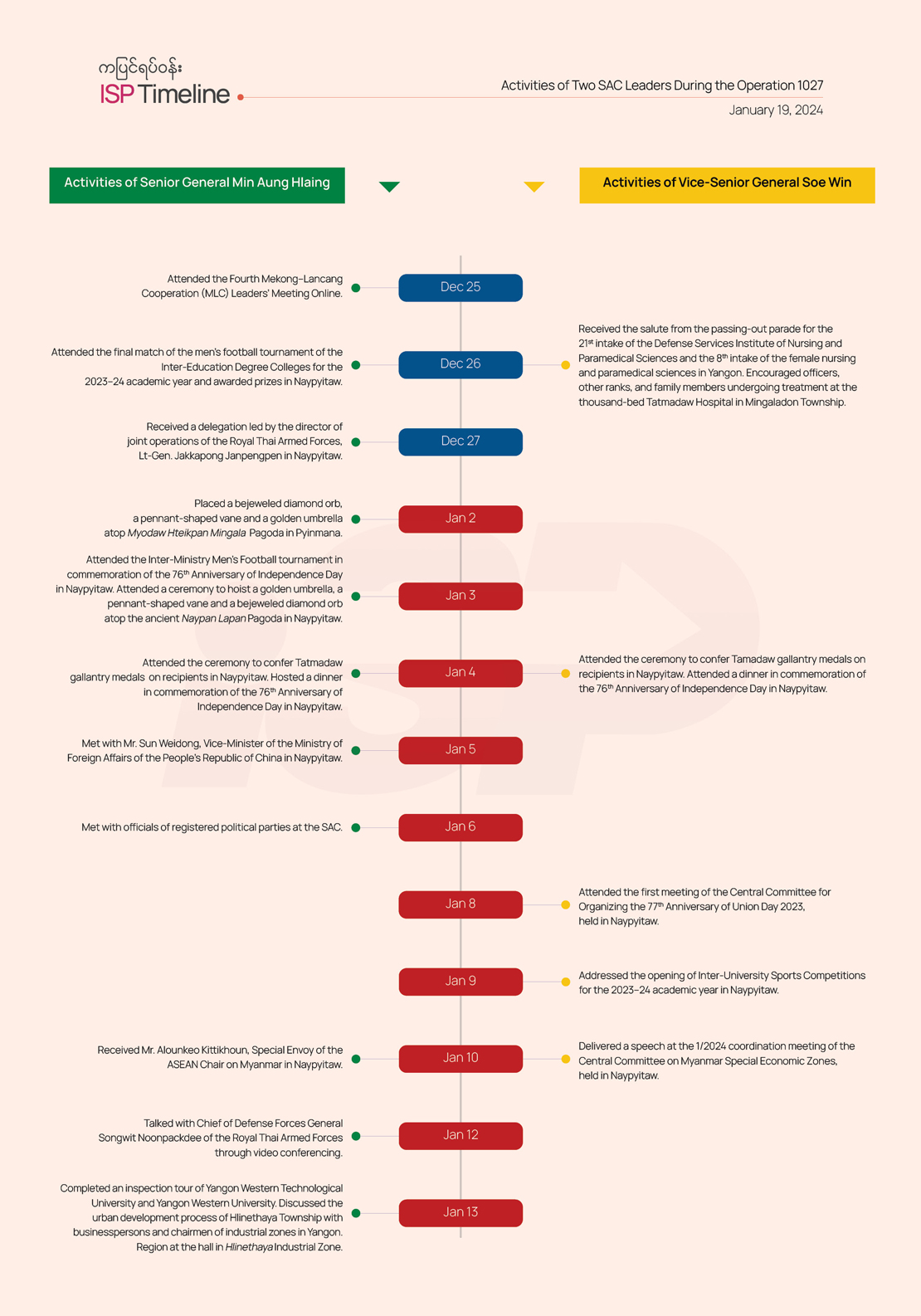
SPOTLIGHTS
This week introduces the “Spotlights” section, which aims to provide a succinct overview of recent noteworthy issues. Seven compelling issues from the past two weeks will be mentioned here chronologically.
NUG’s China Policy
The National Unity Government (NUG), the parallel government, announced their support for the One China Principle and released a ten points policy on China on January 1, 2024. This announcement included that Myanmar would remain obliged to any treaties or agreements signed between the two countries prior to the 2021 coup. This policy is noteworthy considering NUG’s allegedly close relationship with the West, and the concurrence of this policy announcement announcement with the peak moment of the 3BHA’s offensive.
Honoring Delegates of the National Convention
January 4, 2024, saw the 76th Independence Day Ceremony held by the SAC, with no grand military review parade, unlike previous years. Amnesty was granted to 9,652 prisoners, with merely 81 of those being political prisoners. Since the 2021 coup, the SAC has granted 14 amnesties, with a total of 92,560 prisoners released, but only 8.3% of those released were political prisoners. An annual ceremony to award military gallantry medals and titles also took place on the Independence Day. An unusual fact is that 1,021 delegates of the National Convention, which formed the 2008 Constitution, were also awarded with gallantry titles. Myanmar’s history has had three periods of constitutional law, under the 1947 Constitution, which lasted for 15 years, and the 1974 Constitution, which lasted for 14 years. The latest 2008 Constitution has been abolished by the NUG.
Chinese Minister’s Naypyitaw Trip
On January 5, China’s Vice Minister of Foreign Affairs, Mr. Sun Weidong, arrived in Myanmar and held talks with SAC chief Snr. Gen. Min Aung Hlaing. China’s Special Envoy to Asian Affairs, Mr. Deng Xijun, also came along. This trip included a discussion of the bilateral collaboration improvements and border stability issues. The China-Myanmar Economic Corridor (CMEC) and ASEAN–Lancang-Mekong cooperation was also discussed with senior officers from the Ministry of Foreign Affairs. On the same day, the SAC’s Minister of Home Affairs and China’s Minister of Public Security held talks online regarding cross-border crimes and border stability.
Haigeng Agreement
From January 10 to 11, a third meeting between representatives of the SAC and the 3BHA was mediated by China, leading to an agreement for temporary ceasefire in northern Shan State, named “Haigeng Agreement.” Whether this agreement will remain in effect is discussed in the “Trends To Watch” Section. On January 11, Mr. Chen Hai, Chinese Ambassador to Myanmar, published an article entitled “Jointly build a community with a shared future for mankind: Promote the in-depth development of China-Myanmar relations” in SAC’s newspaper, Global New Light of Myanmar. This article was also republished by China’s state-owned Xinhua News Agency.
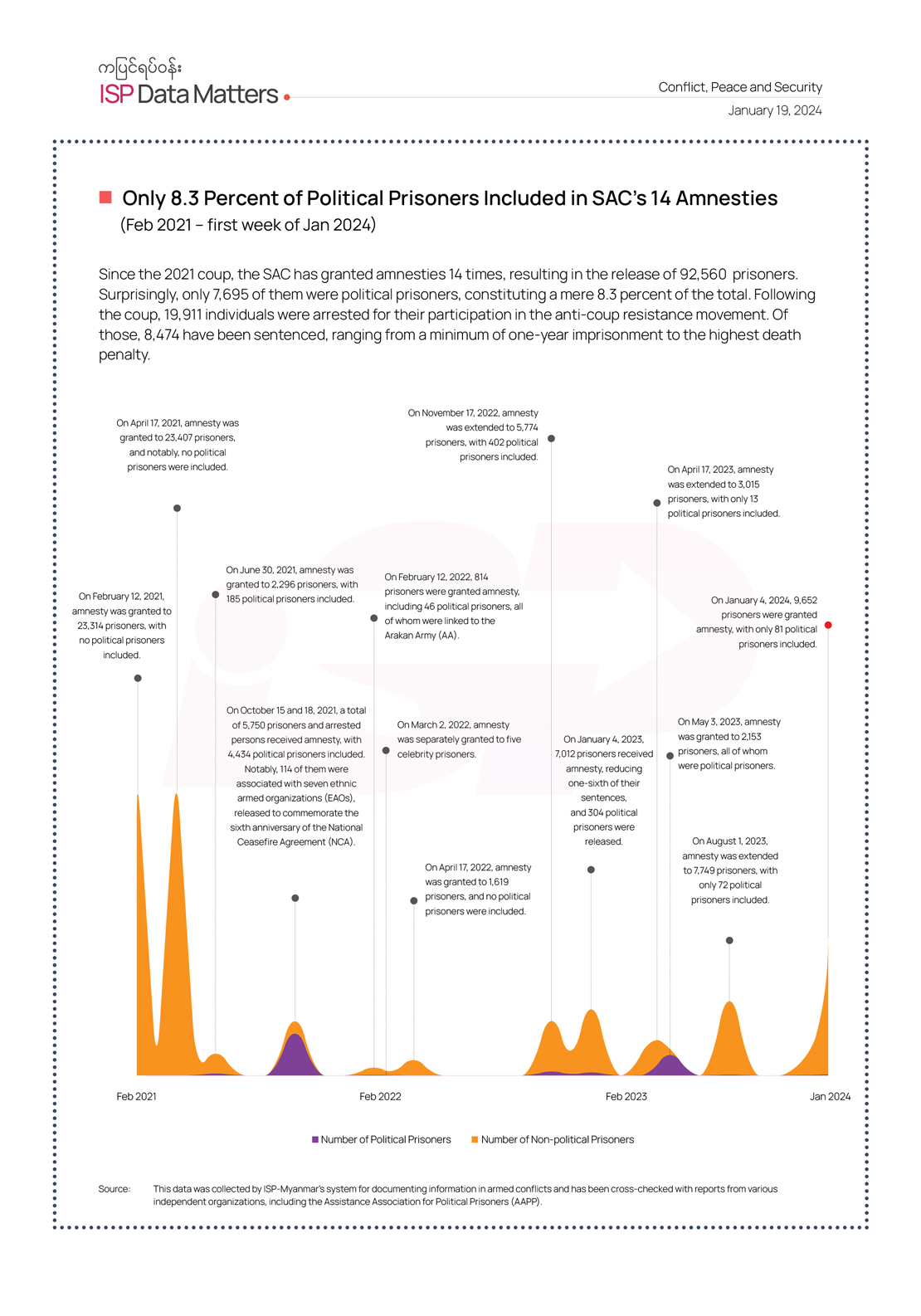
Laos’ First Step on Myanmar
While it is Laos’ turn to be chair of ASEAN for 2024, Myanmar’s special envoy Mr. Alounkeo Kittikhoun arrived in Naypyitaw on January 10. This step indicates a new chair of ASEAN to implement the Five-Point Consensus (5PC) regarding Myanmar. Mr. Alounkeo Kittikhoun is an experienced ambassador, as he is the former Minister to the Prime Minister’s Office of Laos. In addition to his separate meeting with the SAC leader, he also met with leaders who signed the NCA.
Thai Army Chief and SAC Leader
On January 12, Myanmar SAC leader, Snr. Gen. Min Aung Hlaing, met with the chief of the Royal Thai Armed Forces Gen. Songwit Noonpakdee via videoconferencing. It is reported that the discussion included bilateral cooperation in border trade security, drug eradication and counter-terrorism, eradication of illegal trade, online gambling and scam elimination, humanitarian and assistance measures, and the prevention of forest fire and transboundary haze pollution. Thailand and Myanmar’s armed forces have a close relationship. On December 27, the Royal Thai Armed Forces’ Deputy of Operation Division, Lt Gen. Jakkapong Janpengpen, came to Naypyitaw to meet Snr. Gen. Min Aung Hlaing and held discussions on military collaboration and cross-border online scam elimination.Since both meetings included cross-border online scam elimination, the situation in Karen state needs to be observed. In Karen state, Chinese new city projects such as Shwe Kokko New City and KK Park in Myawaddy are infamous as the hubs of online scams and cybercrimes. The media have also assumed that all armed forces in the region make a profit through these activities. While the BGF controls Shwe Kokko, the KNU has announced that they are not associated with KK Park.
Famous Singer, Daw Mar Mar Aye, Will Be Missed
Atragic piece of news alongside politics and warfare is the passing of a popular Myanmar singer, Daw Mar Mar Aye, on January 8. At the age of 81, Daw Mar Mar Aye passed away peacefully at her home in the United States. Due to her popularity for her songs during the 1988 revolutionary era, she had to relocate to a foreign country. Her song “A Thel Nar Kabar Ma Kyay” (အသည်းနာ ကမ္ဘာမကျေ) also became influential during the 2007 Saffron Revolution. Interestingly, the SAC mouthpiece newspaper also reported the news of her passing.

TRENDS TO WATCH
Will the Haigeng Ceasefire Sustain?
Analysts on Myanmar and war observers view that this ceasefire agreement serves only temporary and tactical purposes.
A ceasefire agreement named the “Haigeng Agreement” was made between the representatives of the SAC and the 3BHA during discussions which took place on January 10 and 11, 2024, in Kunming, China. The agreement was decided only after three different meetings convened by the pressure of China. Both sides called this a temporary ceasefire. Hence, it is important to see if this temporary ceasefire backed by China will last.
After two months of the Operation 1027, the 3BHA and allied forces have seized 16 towns and important border trade outposts. They have arrested Officers Commanding, seized several light and heavy weapons and taken over 200 military outposts. In addition to the surrenders of its battalions, the SAC has finally lost Laukkai town, and retreated from their positions east of the Salween River in northern Shan State, causing a huge loss for the SAC.
According to China’s Minister of Foreign Affairs, Ms. Mao Ning, on January 12, both parties came to an agreement on an immediate ceasefire, a pledge to engage in peaceful discussions for respectful altercations and requisitions and not to engage in offensive conflict. Both parties also pledged not to harm Chinese nationals and Chinese projects in the border regions. Also, all parties knowingly agreed to maintain peace and stability along the China–Myanmar border.
However, analysts on Myanmar and war observers view that this ceasefire agreement serves only temporary and tactical purposes. Suspicions were raised among observers because the current temporary ceasefire lacked time frame and territorial demarcation, indicating that there was a lack of conditions in contractual agreement. Although the Myanmar military agreed not to attack the seized regions by the 3BHA forces with heavy artillery or airstrikes, it was not completely guaranteed. During the November 8 National Defense and Security Council (NSDC) meeting, acting president Myint Swe stated that due to the current situation, “the country will be split into parts”. However, two months after the meeting, the SAC forces were not able to retake any camps or reduce its territorial losses. Airstrikes are the only advantage that the SAC forces hold.
There is currently no mutually hurting stalemate, which is required for a successful ceasefire discussion. People therefore hypothesize that gunfire could return anytime. The Myanmar National Democratic Alliance Army (MNDAA) have seized their target, Laukkai, as well as other Kokang regions. A Self-Administered Special Region No. 1 has been declared, and imposed its own administrative system. On the other hand, the Ta’ang National Liberation Army (TNLA) has also seized larger territories beyond their six targeted regions. The Arakan Army (AA) has also resumed clashes with the SAC forces in Rakhine state, where they have seized the entire region of Paletwa. As the “Haigeng Agreement” covers northern Shan State and not on Rakhine State, battles may continue to be critical. The SAC might want to regain control over the border crossings and the strategic military camps. It has been two-and-a-half months since the border trade gates in Chinshwehaw and Muse 105th mile were shut down. These will not be easily handed over.
From China’s perspective, it prefers immediate border stability. On the other hand, there are greater interests at stake, such as the China–Myanmar Economic Corridor (CMEC) and trade investment benefits. A supplemental agreement was recently signed regarding the Kyaukphyu Special Economic Zone and deep seaport. China is reportedly to fix the damaged bridges at the main transportation roads connected to the northern region. However, organizations that attended the discussion have not announced this fact. This kind of agreement will restrain both sides of the conflict actors’ damages on infrastructure. This fact highlights the importance of intervening power. Japan’s Sasakawa has positively intervened in Myanmar’s conflict, especially the Rakhine conflict, but the intervening power does not hold the same weight as China physically or systematically.
The 3BHA announced that the temporary ceasefire was agreed due to irresistible reasons. China threatened to close the flow of resources into the 3BHA’s seized regions. A further transparent announcement has not been made on this. 3BHA stated that their objective of ending the dictatorship and fighting alongside the Spring Revolution has not been completely given up yet, but more limitations upon them have grown bigger. Conversely, losing control proves to be a bitter pill for the Myanmar military to swallow, considering their longstanding role as the guardians of Myanmar throughout its entire history. Without any other strong agreement, conflicts can ignite at any time.


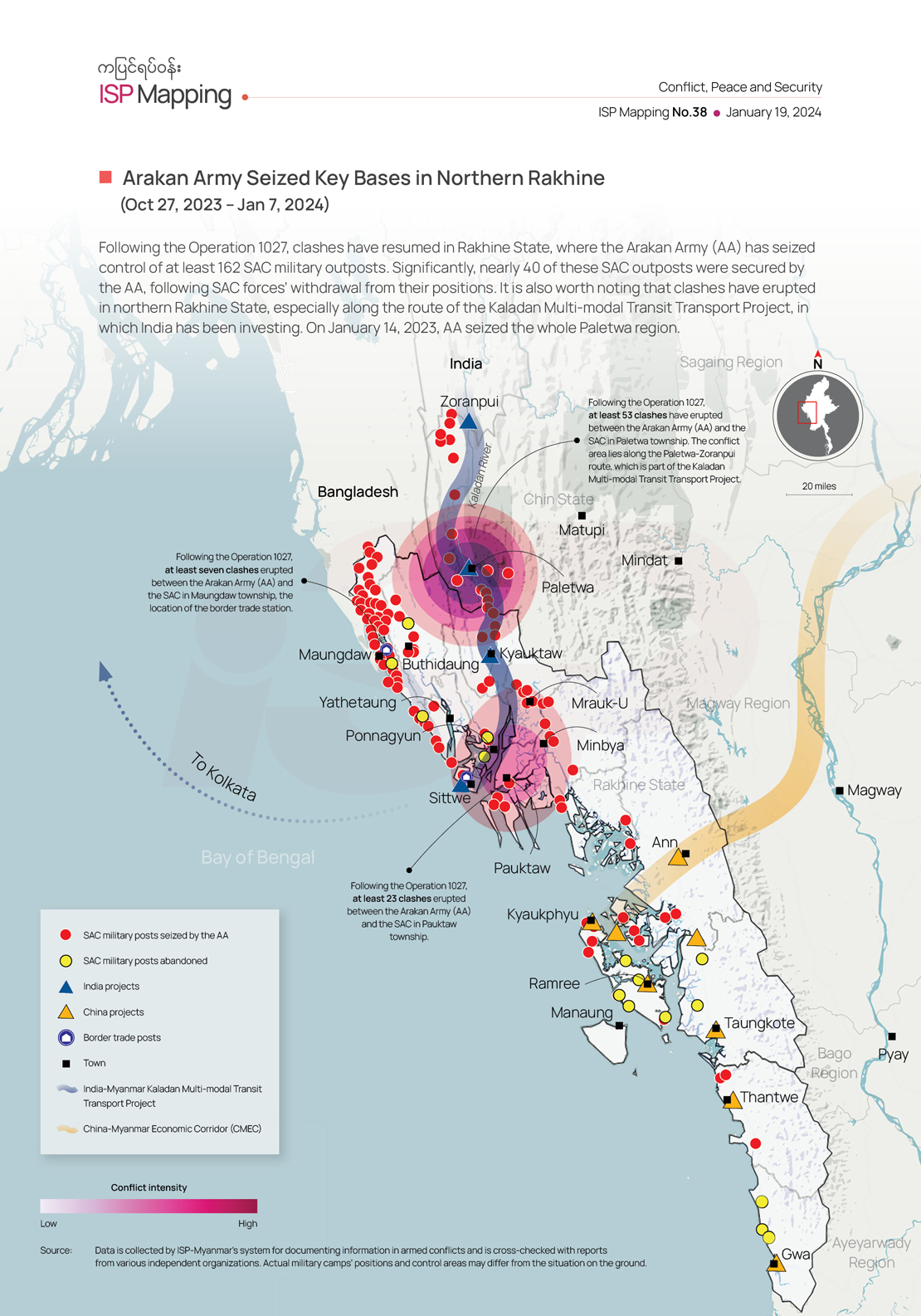
WHAT ISP IS READING
Elections Across the World in 2024
The Economist claims 2024 to be “the biggest election year in history”. This, however, does not necessarily mean a thriving democracy.
An extraordinary fact about 2024 is that 64 countries will hold elections and over four billion people will be voting. This indicates the increase in the number of voters and rights to vote. The Economist claims 2024 to be “the biggest election year in history”. This, however, does not necessarily mean a thriving democracy, and not all elections will be fair.
The earliest general election of 2024 took place on January 7 in Bangladesh. Current prime minister Sheikh Hasina announced that the Awami League emerged victorious, with 40% of the vote and 222 out of 350 elected representatives in the legislature. The election was held under strict security measures taken by the police and military forces. However, the Bangladesh Nationalist Party (BNP) boycotted from the election because of oppression against opposition parties. Widespread protests are also announced to take place. As Sheikh Hasina’s reign as prime minister continues into her fourth term, there are widespread allegations of dictatorship.
The presidential election of Taiwan was held on January 13. It was mainly a competition between the incumbent government, the Democratic Progressive Party (DDP), and the nationalist Kuomintang (KMT) party. These parties have different perspectives towards mainland China. DDP, as a nationalist party, does not accord any value to cross-strait relations. On the other hand, the KMT views themselves and mainland China as part of the Chinese culture, with a difference in political definition. The DDP presidential candidate Lai Ching-Te won the election with 40.1% of the vote, while the opposing Kuomintang won 33.5% of the vote. Regardless of the election outcome, both parties are inclined to maintain positive relations with China, which is very geographically close. To prevent a reason for an invasion of the island, the government, no matter what party is in power, prefers to retain the status quo.
The 2024 election will be held in the United States in November. The competition will be intense given the situation of political polarization. The long-problematic politics of the country could have harmful consequences not only for America but globally. The electorate is unfavorable towards President Joe Biden, due to the entry of six million illegal immigrants, weak foreign policy, and the fragile economy experienced during his term. Subsequently, there are worries that the Republican candidate Trump might become president again, amidst criminal law suits against him.
Venezuela will also be holding an election, despite the fact that millions have fled the country in recent years. President Nicolas Maduro’s socialist government seems to plan for an election victory due to his stance on current issues, such as a referendum and annexation of the oil-rich Guyana region.
A powerful neighbor of Myanmar, India, will also be holding a parliamentary election around April or May. Prime Minister Narendra Modi’s magic still seems to be in effect. If he is re-elected, this will lead to economic and middle-class growth. India is becoming closer with America as a counterweight to China on the political scales. The year 2024 will also see elections in Azerbaijan, Bhutan, Britain, Indonesia, Iran, Israel, Malaysia, Mongolia, Nepal, Pakistan, Russia, South Korea, Sri Lanka, and Turkey.

To receive ISP Insight Emails in your inbox, subscribe at this link.

